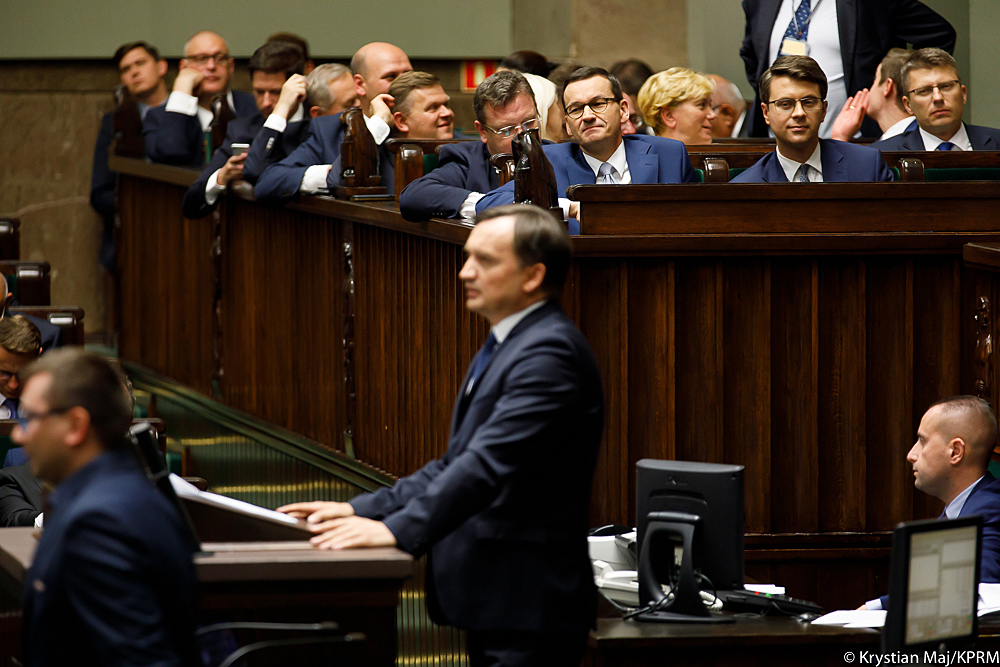The lower house of Poland’s parliament has given final approval to a bill that would eliminate the disciplinary chamber for judges, which is a requirement for unlocking billions in frozen European Union funds.
In passing the bill, the Sejm, where the Law and Justice (PiS) government has a majority, overturned almost all of the amendments added to the legislation by the upper-house Senate, where the opposition has a majority.
Some opposition politicians and commentators argue that, without those amendments, the law will not fulfil the milestones that the Polish government has agreed with the European Commission, and therefore mean Poland’s funds will remain frozen.
This is what happens when you are dealing with crooks. President @vonderleyen snubbed by Polish government which restores the worst version of the judicial bill, falling far short of EU’s milestones. A show of “good will” for von der Leyen is over. What will she do now? @ProfPech
— Wojciech Sadurski (@WojSadurski) June 9, 2022
One of the rejected amendments stipulated that all previous rulings by the disciplinary chamber are to be considered invalid and devoid of any legal consequences. Another removed from the legislation a new disciplinary offence defined as “refusal to implement justice”.
A further rejected amendment would have required that candidates for the new “chamber of professional responsibility” – which will replace the disciplinary chamber – will be required to have at least seven years of experience in ruling in the Supreme Court.
Another stated that current disciplinary chamber judges would have to stop adjudicating on the Supreme Court completely on the date when the new legislation comes into force, without an option to retire.
Parliament has approved the abolition of the disciplinary chamber for judges, one of the EU's key demands to unlock billions in funds.
But the opposition argues that the move simply makes cosmetic changes, replacing one disciplinary chamber with another https://t.co/KMfVKkWxJV
— Notes from Poland 🇵🇱 (@notesfrompoland) May 27, 2022
The final version of the bill approved by the Sejm yesterday now passes to President Andrzej Duda, usually a PiS ally, who initially proposed the legislation himself in February. He can sign it, veto it, or send it to the constitutional court for assessment.
If the law goes into force, the government hopes that it will help unlock around €36 billion in Covid recovery funds for Poland that the European Commission has frozen over rule-of-law concerns.
However, opposition politicians yesterday warned that, without their proposed amendments, the bill will not meet the requirements set out by the commission.
Gdy sprawa KPO wisi na włosku, PiS daje w Sejmie i w KRS powody do utwardzenia stanowiska Komisji Europejskiej.
Samobójcza taktyka albo sabotaż. https://t.co/43wmDc702R— Radosław Sikorski MEP 🇵🇱🇪🇺 (@sikorskiradek) June 9, 2022
“When the [recovery funds] are hanging in the balance, PiS gives the European Commission reasons to harden its position,” tweeted opposition MEP and former foreign minister Radosław Sikorski. “A suicide tactic or sabotage.”
Maciej Taborowski, a legal scholar specialising in EU law, told Gazeta Wyborcza that there is a risk Poland will not receive the funds, though he admitted that the commission’s decision will be “largely political”.
However, the spokesman for the Supreme Court, Aleksander Stępkowski, welcomed the Sejm’s rejection of the opposition amendments, which he told the Polish Press Agency (PAP) were “mostly unconstitutional or aimed at perpetuating destabilizing divisions in the judiciary”.
Jakby ktoś pytał, to @pisorgpl i @SolidarnaPL blokują pieniądze z KPO‼️
Sejm odrzucił poprawki Senatu do nowelizacji ustawy o Sądzie Najwyższym, które mogłyby się przyczynić do spełnienia „kamieni milowych” Komisji.
Te pieniądze Polska zobaczy dopiero po zmianie władzy…— Robert Biedroń (@RobertBiedron) June 9, 2022
Last month, the Polish government announced that it had agreed with Brussels the “milestones” needed to unlock the funds. Those include liquidating the disciplinary chamber but also wider reforms of the disciplinary system and the restoration of judges previously removed from their positions.
During a visit to Warsaw last week, European Commission President Ursula von der Leyen confirmed that an agreement had been reached to release Poland’s funds, but she emphasised that this would only happen if and when Poland understakes the necessary reforms.
Yesterday the European Parliament adopted a resolution in which its expressed its “worry that the Commission’s milestones are not enough and stressed that full compliance with EU values is a prerequisite for funding”
"No money will be disbursed [to Poland] until these reforms are undertaken," @vonderleyen told the European Parliament in an effort to reassure MEPs concerned about the @EU_Commission's deal to unblock Poland's funds if it implements judicial reforms https://t.co/rkOceznJnK
— Notes from Poland 🇵🇱 (@notesfrompoland) June 8, 2022
Main image credit: Krystian Maj / KPRM (under public domain)

Agnieszka Wądołowska is deputy editor-in-chief of Notes from Poland. She is a member of the European Press Prize’s preparatory committee. She was 2022 Fellow at the Entrepreneurial Journalism Creators Program at City University of New York. In 2024, she graduated from the Advanced Leadership Programme for Top Talents at the Center for Leadership. She has previously contributed to Gazeta Wyborcza, Wysokie Obcasy and Duży Format.




















